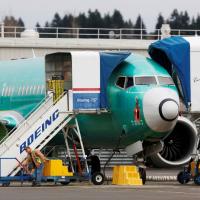
Boeing's orders for new planes fell to a 16-year low in 2019 after two crashes of the 737 MAX killed 346 people and led to the worldwide grounding of the plane, costing the company nearly $10 billion and its title as the world's largest aircraft manufacturer.
Before cancellations, Boeing said it received 246 orders for all types of new planes last year, the lowest number since 2003. Prior to 2019, Boeing had booked orders for about 4,500 MAX jets, or enough to keep the production line running for seven to 10 years. However, Boeing temporarily halted production this month because it has about 400 completed but undelivered planes in storage.
Boeing said Tuesday that it delivered 380 planes last year, including 127 MAX jets. That's about 44 percent of the 863 planes delivered by European rival Airbus, now the world's largest aircraft builder.
Last year, Airbus delivered 690 single-aisle planes that compete with the 737 MAX, Boeing's top seller. It's unclear when the US Federal Aviation Administration (FAA) and regulators around the world will approve the MAX's return to the sky after crashes in Indonesia in 2018 and Ethiopia in 2019.
Last year, Boeing delivered 158 long-haul twin-aisle Dreamliners. That's 13 more than in 2018, and 80 more large planes of all types than Airbus in 2019.
In midday trading, Boeing's stock ticked up on news of strong Dreamliner deliveries; it closed Tuesday at $332.35, up $2.13 a share, or 0.65 percent. The 52-week range is $319.55 to $446.01.
David Calhoun took over as Boeing's CEO Monday and immediately faced new problems.
Moody's Investors Service said on Monday that it placed Boeing's debt on a 90-day review for a possible downgrade. Less than a month ago, Moody's cut Boeing's credit rating one grade as problems with the MAX drag on longer than anticipated. The lower bond rating means Boeing must pay more to borrow.
"Recent developments suggest a more costly and protracted recovering for Boeing to restore confidence with its various market constituents, and an ensuing period of heightened operational and financial risk, even if certification of the MAX comes relatively near term, as expected," Moody's analyst Jonathan Root said in a note to investors.
During his first day on the job Monday, Boeing's new CEO told employees that the public was "rightly disappointed in us".
In an email to about 150,000 employees setting priorities to turn the company around, Calhoun said: "This is a crucial time for Boeing. We have work to do to uphold our values and to build on our strength. I see greatness in this company, but I also see opportunities to be better. Much better," the Financial Times reported. "We will listen, seek feedback and respond —appropriately, urgently and respectfully."
In emails Boeing disclosed last week, some employees mocked the FAA, questioned the need for additional flight simulator training for pilots and called Lion Air, the Indonesian airline involved in the first crash, "idiots" for asking for additional training in the MAX.
In one exchange reported by Bloomberg News and Forbes on Monday, an unnamed Boeing employee wrote: "Now friggin' (Lion Air) might need a sim (flight simulator, a ground-based, computer-driven mockup of the MAX's cockpit controls) to fly the MAX and maybe because of their own stupidity. I'm scrambling trying to figure out how to unscrew this now! Idiots."
Another employee responded, "WHAT THE F%$&!!!! But their sister airline is already flying it!" — an apparent reference to Malaysian carrier Malindo Air.
Lion Air declined to respond when asked if it were the airline named in the messages, but people familiar with the matter told Bloomberg that Lion Air had asked about simulator training before accepting Boeing's word that it was not necessary.
Earlier this month, Boeing reversed itself and said it would recommend pilots receive flight simulator training before flying the MAX.
A report on the crash of the Lion Air flight in October 2018 criticized Boeing for not telling airlines about the MAX's new anti-stall device.
Investigators believe the MAX's automated anti-stall device, called Maneuvering Characteristics Augmentation System (MCAS), erroneously pointed the nose of the planes down to avoid a midair stall and into a fatal plunge. Boeing has updated the system's software, but the FAA has not yet approved it.
In a filing with the US Securities and Exchange Commission, Boeing said Calhoun will receive a $7 million bonus if he secures regulatory approval for the MAX to return to commercial service. Some lawmakers criticized the deal.
"This payment represents a clear financial incentive for Mr. Calhoun to pressure regulators into un-grounding the 737 MAX, as well as rush the investigations and reforms needed to guarantee public safety," Democratic senators Edward Markey of Massachusetts, Richard Blumenthal of Connecticut and Tammy Baldwin of Wisconsin wrote in a letter to Boeing's Board of Directors on Monday.
In a statement, Boeing said the "safe return to service of the MAX is our top priority".
"This includes following the lead of our regulators and working with them to ensure they're satisfied completely with the airplane and our work. The Board and CEO are in full agreement that the safe return to service of the 737 MAX must be done with full regulatory oversight," the company said.
